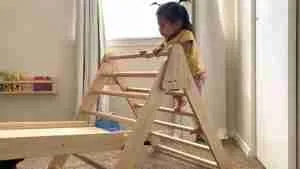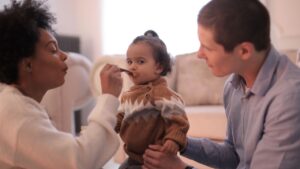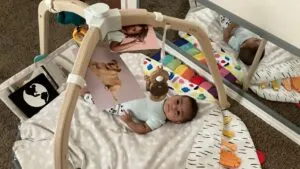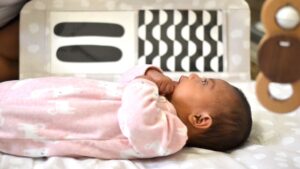
7 Overlooked Reasons For Late Walking In Babies
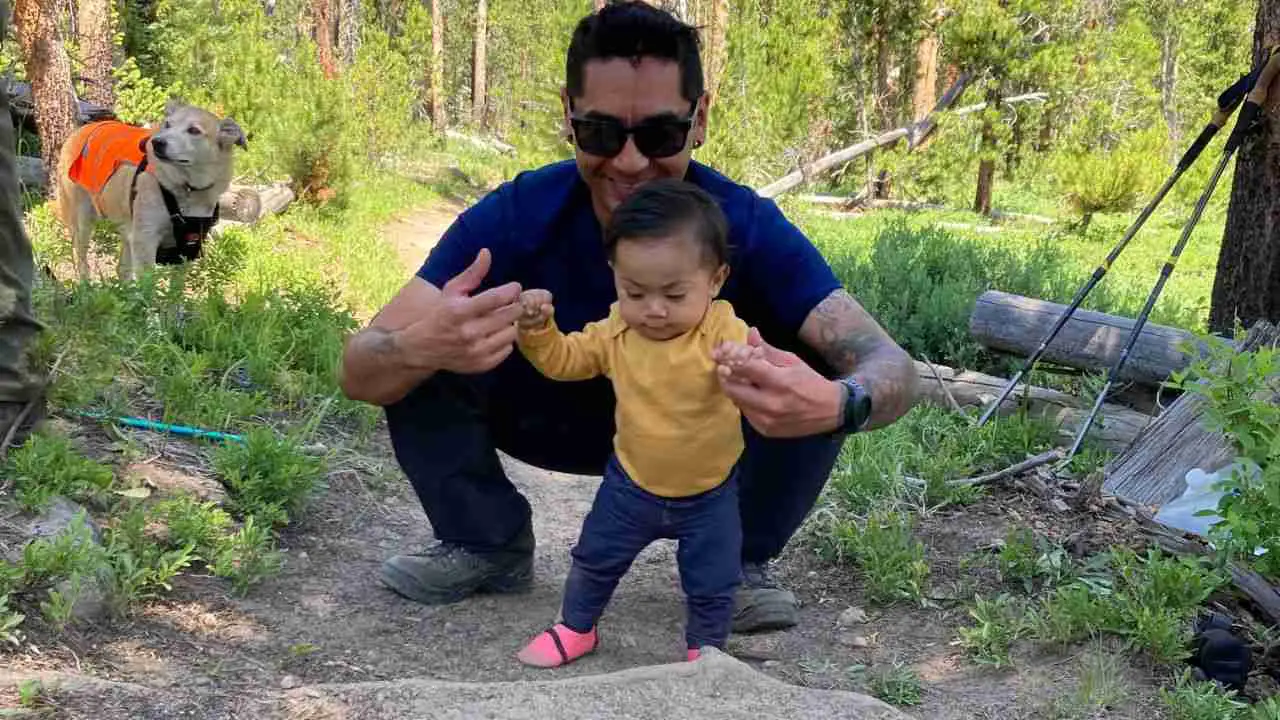
*Disclosure: I only recommend products I would use myself and all opinions expressed here are our own. This post may contain affiliate links that at no additional cost to you, I may earn a small commission. Thank you for your support!
Share this post
Most babies begin walking at around 10 to 12 months and by 18 months, they should be walking independently.
The overuse of baby bouncers, lack of tummy time, and an environment that does not support physical and cognitive development are the most common reasons for late walking in babies.
My daughter began walking at 9 months and by 12 months, she was running and hiking independently.
This is because I set up the right environment that allowed her to explore her surroundings independently.
Don’t be alarmed if your child is not walking by 14 or 18 months. I will explain some reasons why this is happening.
Please note that the reasons I describe below are related to the environment of your baby and do not consider neurological or muscular disorders.
7 reasons for late walking in babies
Let’s dive deep into some mistakes you may be making that are preventing your child from walking.
1. Inappropriate room setup
This is the most common mistake parents make that hinders their child’s ability to walk.
An environment that is arranged in a way that encourages exploration and movement is important in developing fine and gross motor skills which are necessary to walk.
A well-prepared environment is essential in your Montessori home because it empowers your child to learn through self-directed activities.
One piece of Montessori furniture I recommend is a baby-sized pull-up bar. This will help your child pull up and stand up on their own and strengthen their core muscles.
You can also place age-appropriate toys and objects within your baby’s reach to stimulate their curiosity and desire to move.
But don’t just buy any toy that shines and plays music. Instead, choose toys that encourage reaching, grasping, and pushing, as these movements develop their fine and gross motor skills.
2. Inadequate tummy time
Baby loungers are great to allow your baby to rest but leaving them there for extended periods of time may affect their ability to walk.
Tummy time has so many benefits like strengthening your baby’s neck, back, and core muscles which improve their head control and motor skills.
As your baby spends time on their tummy, they improve their overall physical development which lay the foundation for future milestones like crawling and eventually walking.
You can introduce this fun activity from an early age to maximize its benefits. Begin with short periods, gradually increasing the duration as your baby becomes more comfortable.
You can join your child on the floor and engage with them to make this activity interactive and enjoyable.
You can provide simple toys to reach for and offer gentle encouragement. If you have a newborn or infant, you can hold a toy in front of them to encourage them to lift their head up.
On a side note, your baby may resist being on their tummy at first but this does not mean that you should discontinue this activity.
My daughter didn’t like being on her tummy, so I used a Boppy pillow to lift her body up a bit and this made tummy time easier while she still gained the same benefits.
3. Unsupportive footwear
Should your baby wear shoes when they learn to walk? My simple rule is to let your baby walk barefoot inside your home but protect their feet with appropriate footwear once they step outside.

As your baby progresses towards walking independently, their footwear becomes crucial. But keep in mind that they can’t just wear any type of shoe.
Their feet are developing and they need appropriate shoes that will support healthy foot development.
Cute and colorful shoes may look nice but can lead to foot problems down the road.
I suggest you get your child shoes with a wide toe box that accommodates the natural spread of their toes and promotes proper foot development.
There are only two brands that I trust: Ten Little and Stride Rite. These brands make shoes for new walkers that are APMA-approved to ensure that your baby’s feet develop naturally.
In fact, I did a lot of research on this topic and created an article about the best baby shoes for new walkers, so make sure you check it out.
4. Overuse of baby equipment
You may think that baby equipment like walkers, bouncers, and jumpers is convenient and entertaining.
The truth is that excessive use of these devices can hinder your baby’s natural development. This is why some of these devices are banned in some countries like Canada.
A study by the National Library of Medicine showed that prolonged use of baby walkers can delay independent walking and may even lead to accidents.
Instead of relying on this equipment, focus on creating an environment that allows your baby to move and discover at their own pace.
Set up your child’s bedroom so they can practice rolling, crawling, and standing independently. Place safe furniture like the pull-up bar for your baby to hold onto and explore while standing.
This simple Montessori pull-up bar will support your baby’s balance and gradually build the confidence to take those first steps.
5. Confinement and excessive carrying
Carrying your baby is a beautiful way to bond and provide comfort, but too much of it can discourage them from attempting to walk.
Similarly, a crib can hinder your baby’s ability to explore and move freely because it confines their movement to a limited space.
You will notice that your baby is naturally curious and eager to explore their surroundings, and movement is a fundamental part of their learning process.
So instead of carrying your child everywhere you go or placing them in a crib, let them move independently so they can develop body awareness, coordination, and strength.
Set up play areas on the floor with Montessori toys to encourage your child to move, and help your little one to practice standing and walking along furniture.
This simple modification will help your baby walk and gain confidence and independence in their physical abilities so they can begin walking on their own.
6. Inconsistent routines and lack of toys that promote movement
I highly believe that babies thrive when they have a daily routine because routines are beneficial to their overall development.
Your baby will engage in various activities that involve the development of their walking skills when they have daily routines.
You need to incorporate playtime into their routines so they can anticipate the type of exercises or activities they will perform.
Also, these activities should involve toys that promote movement such as activity gyms, sensory balls, and stacking blocks.
These toys will encourage your child to reach for them, crawl to get them, or stand up to place one block on top of another.
7. Relying too much on baby carriers
I am not going to lie, baby carriers are useful and convenient for carrying your little one around. But relying on baby carriers can limit your baby’s opportunities for exploration and movement.
I know parenting is a busy and challenging job but it is important to spend dedicated and quality time to help your baby develop to their fullest potential.
Spend time on the floor with your baby. Do some tummy time together, practice rolling a ball or crawling with them.
Gradually limit the use of the baby carrier and allow your child to move from one place to another independently.
Encourage them to explore their surroundings freely. Simple activities like these will build your baby’s confidence and coordination.
When to see a doctor
As I mentioned earlier, this article is about creating the right environment to help your child walk. You will see a huge improvement in your baby’s walking skills when you make some of the adjustments I suggested.
In some cases, babies experience several muscular and neurological disorders that can affect their ability to walk.
If your baby is showing signs of motor delay, such as having difficulty with some motor milestones, you should seek medical advice.
Consult with your pediatrician who is qualified to assess your baby’s development, rule out any underlying issues, and provide appropriate guidance and support.
Got questions? Check out our FAQ below
What age is considered delayed walking?
Most babies begin to walk between 9 and 12 months and they can take their first independent steps by 14 months.
It is generally considered a delayed milestone if your baby is not walking at 20 months. But remember that every child develops at their own pace and some may naturally take longer to start walking.
When should I worry about my baby not walking?
If your baby is not walking by 18 months and shows signs of motor delay, it’s best to talk with your pediatrician.
Your pediatrician can help you identify any potential issues and provide appropriate support.
Is it normal for a 2-year-old not to walk?
In my personal experience, it is not normal since most children begin to walk independently by 18 months (and I think this is late), unless your child has a neurological or muscular condition.
If you are concerned, you should see your pediatrician who can give you more information about your baby’s development.
Is late walking a sign of autism?
Some autistic babies may show delays in walking, but you should note that not all late walkers have autism, and not all autistic babies experience delayed walking.
Autism is a complex neurodevelopmental condition that involves a wide range of behavioral and social differences.
If you have concerns about your baby’s development, it’s best to seek guidance from a healthcare professional.
Do walker toys delay walking?
Yes, walker toys don’t allow your baby to use their muscles for balance and support and this hinders their ability to walk independently.
This is why baby walkers are banned in some countries.
What to do next?
In the Montessori setting, our goal is to provide a nurturing environment that allows your child to thrive and develop lifelong skills, including crawling and walking.
But creating the right environment doesn’t have to be complicated or expensive. My article on how to create a Montessori bedroom is your guide to making it happen.
So make it happen!
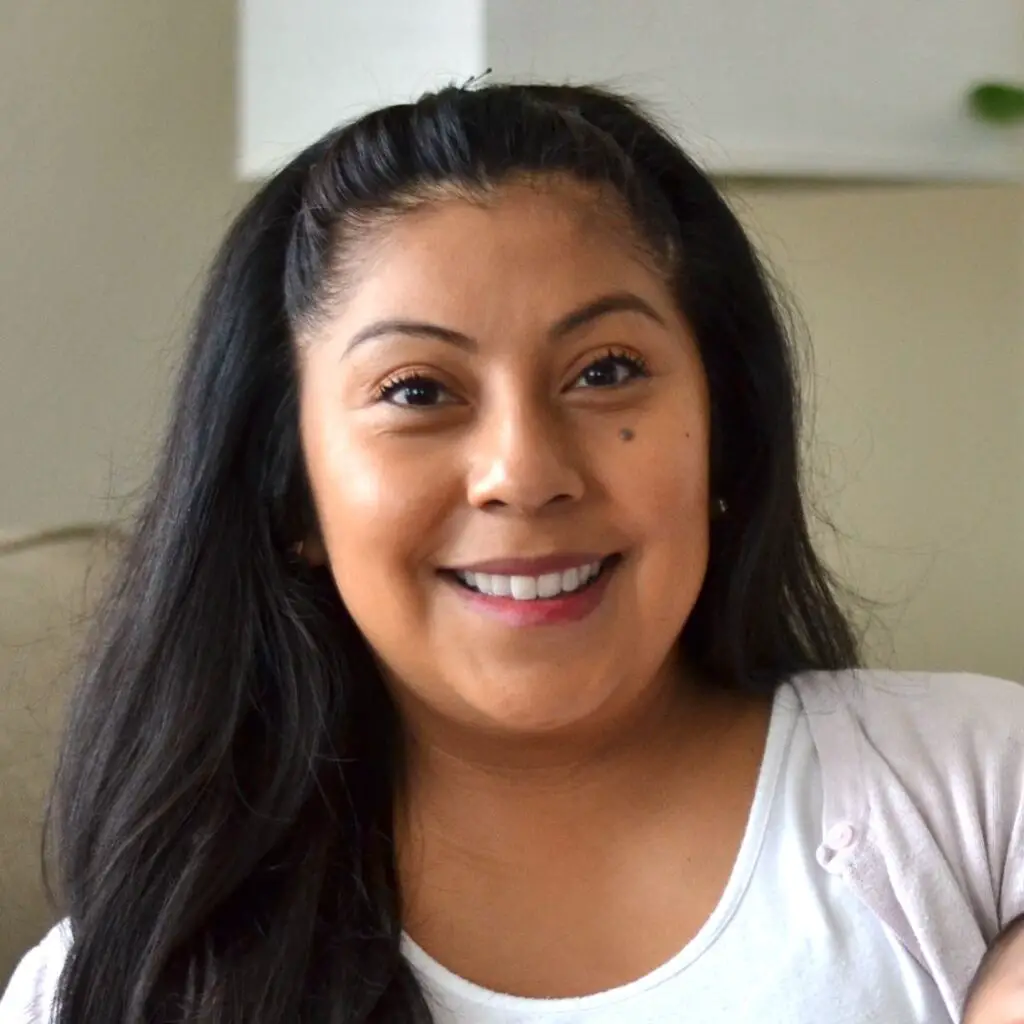
Hello, I am Leslie. I am on a mission to help you support the growth and development of your child. With the right tools and proper guidance, you can navigate parenthood with confidence and assertion! My goal is to equip you with knowledge to help you construct a strong foundation for your child’s life.
Suggested articles
You May Also Like

When Do You Start Baby Led Weaning?
Baby led weaning typically starts when babies are around six months old and showing signs of being ready to start solid foods, such as sitting up with support, having good head and neck control, and showing interest in food.

Do You Need A Diaper Pail? 5 Alternatives That Work
A diaper pail is not necessary to get rid of stinky and soiled diapers. You can throw dirty diapers in a regular trash can or bag them individually in a plastic bag and dispose of them.
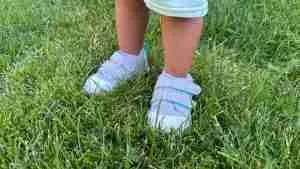
Ten Little First Walkers: The Best Shoes For Early Walkers
The Ten Little First Walkers have a wide toe box, flat and flexible soles, and approved by APMA.


